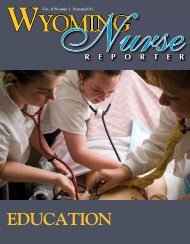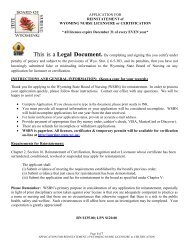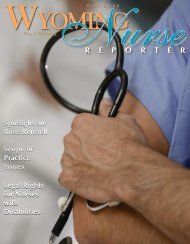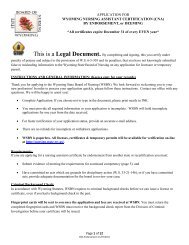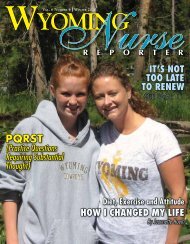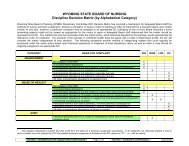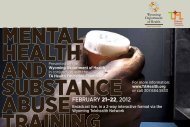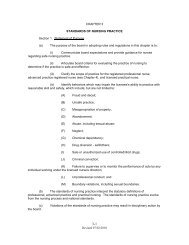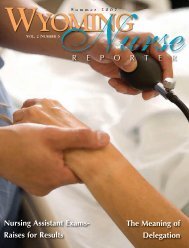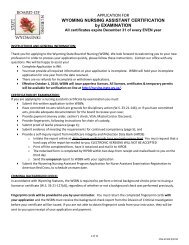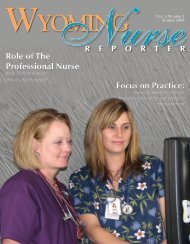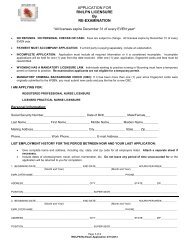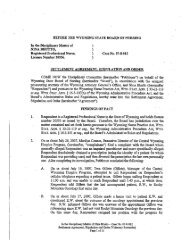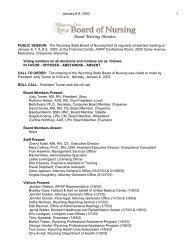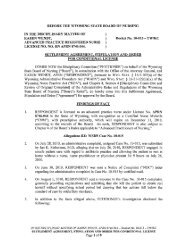Nurse Reporter Spring 2009 - Wyoming State Board of Nursing
Nurse Reporter Spring 2009 - Wyoming State Board of Nursing
Nurse Reporter Spring 2009 - Wyoming State Board of Nursing
You also want an ePaper? Increase the reach of your titles
YUMPU automatically turns print PDFs into web optimized ePapers that Google loves.
George Vandel, NCAC II, CAP<br />
The <strong>Wyoming</strong> Pr<strong>of</strong>essional Assistance<br />
Program’s (WPAP) mission<br />
is to provide resources and support<br />
to <strong>Wyoming</strong> pr<strong>of</strong>essionals suffering<br />
from substance abuse disorders. It was formally<br />
established in 1997 in a joint effort between the<br />
<strong>Wyoming</strong> Medical Society and the <strong>Wyoming</strong><br />
<strong>Board</strong> <strong>of</strong> Medicine. In 1998, the <strong>Board</strong> <strong>of</strong> <strong>Nursing</strong>,<br />
<strong>Board</strong> <strong>of</strong> Pharmacy, and the<br />
<strong>Board</strong> <strong>of</strong> Dental Examiners joined.<br />
In 2005, the <strong>Board</strong> <strong>of</strong> Veterinarian<br />
Medicine signed an agreement and<br />
in 2006 the <strong>Wyoming</strong> <strong>State</strong> Bar<br />
and Judiciary signed agreements.<br />
The mental health pr<strong>of</strong>essions<br />
licensing board signed an agreement<br />
in 2007. Fifteen <strong>Wyoming</strong><br />
hospitals have signed agreements.<br />
Although some hospitals in <strong>Wyoming</strong><br />
have not signed agreements<br />
due to the cost <strong>of</strong> the service agreement,<br />
their employees can still<br />
take advantage <strong>of</strong> WPAP resources<br />
and support. Agreement fees<br />
are prorated based on the number<br />
<strong>of</strong> employees in an institution. In<br />
the case <strong>of</strong> an individual seeking<br />
the services <strong>of</strong> WPAP, a monthly<br />
fee is determined based on the<br />
pr<strong>of</strong>ession to which the person belongs.<br />
For example, physicians pay<br />
$185 a month, attorneys, dentists,<br />
veterinarians $165, physician’s assistants<br />
and pharmacists $90, RNs<br />
$50 and LPNs and pharmacy technicians<br />
and others $30 a month.<br />
WPAP assists individuals,<br />
hospitals and licensing boards<br />
with intervention services and<br />
education as well as helping with<br />
writing policies and establishing<br />
drug screening procedures. A pr<strong>of</strong>essional<br />
experiencing a substance<br />
abuse disorder is provided access<br />
to timely intervention, evaluation,<br />
referral and support for treatment.<br />
An important component <strong>of</strong> the<br />
WPAP program is the Monitoring Agreement<br />
that is agreed to and signed by pr<strong>of</strong>essional when<br />
entering the program. This agreement provides<br />
an individualized treatment plan and structure<br />
for the pr<strong>of</strong>essional. Responsibilities and expectations<br />
are clearly identified along with consequences<br />
for failure to meet these requirements.<br />
Guidance is provided before returning to pr<strong>of</strong>essional<br />
practice. Long-term monitoring and aftercare,<br />
including relapse prevention and detection<br />
are provided. The goal is to preserve health and<br />
pr<strong>of</strong>essional talents. The licensing board is not<br />
notified that a pr<strong>of</strong>essional is being monitored<br />
unless the individual is not compliant with the<br />
terms <strong>of</strong> the monitoring agreement.<br />
Pr<strong>of</strong>essionals in the program, whether referred<br />
by their employer, family, friends or peers can continue<br />
to work providing they have been through a<br />
rehabilitation program and have been evaluated<br />
The <strong>Wyoming</strong><br />
Pr<strong>of</strong>essional<br />
Assistance Program’s<br />
(WPAP) mission is to<br />
provide resources and<br />
support to <strong>Wyoming</strong><br />
pr<strong>of</strong>essionals suffering<br />
from substance abuse<br />
disorders.<br />
for fitness to continue to work. Oversight for a<br />
pr<strong>of</strong>essional’s recovery is provided by the following:<br />
a site monitor, random drug screening, attendance<br />
and participation in Caduceus meetings<br />
and daily contact with WPAP staff. There are<br />
nine sites in <strong>Wyoming</strong> where Caduceus meetings<br />
are held: Casper, Cheyenne, Sheridan, Gillette,<br />
Rock <strong>Spring</strong>s, Riverton, Evanston, Laramie and<br />
Cody.<br />
The concept <strong>of</strong> the Caduceus Group was initiated<br />
as a component <strong>of</strong> the Georgia Impaired<br />
Physicians Program in 1973. A group was formed<br />
in Casper in 1983. The two most evident and<br />
valuable results <strong>of</strong> the Caduceus Group have<br />
been the number <strong>of</strong> impaired pr<strong>of</strong>essionals who<br />
been able to get into treatment by intervention<br />
or self-realization, and the large number <strong>of</strong> pr<strong>of</strong>essionals<br />
for whom the Caduceus Group has<br />
provided a bridge into Alcoholic Anonymous<br />
and Narcotics Anonymous. Caduceus<br />
Groups are educational and therapeutic<br />
centers for recovering pr<strong>of</strong>essionals.<br />
A monitoring agreement can be<br />
signed for a minimum <strong>of</strong> two years, but<br />
most participants are in the program<br />
for five years. If a pr<strong>of</strong>essional decides<br />
to leave <strong>Wyoming</strong>, WPAP staff must be<br />
notified. Compliance with the monitoring<br />
agreement is continued as the pr<strong>of</strong>essional<br />
continues to maintain daily contact<br />
and random drug screening.<br />
Before the existence <strong>of</strong> WPAP, pr<strong>of</strong>essionals<br />
with known substance abuse<br />
disorders lost their license to practice.<br />
This agency helps to identify, treat, and<br />
rehabilitate pr<strong>of</strong>essionals who have an<br />
addiction. Pr<strong>of</strong>essionals need help when<br />
experiencing problems coping with patients/clients<br />
or with the stress <strong>of</strong> practice<br />
or if experiencing increasing financial,<br />
legal problems, suits, divorce, etc.<br />
Warning signs include depression, anger,<br />
abusive behavior, drinking more than a<br />
moderate amount <strong>of</strong> alcohol, personality<br />
changes when drinking, self-prescribing<br />
mood altering drugs, sexual or relationship<br />
problems, placing work ahead <strong>of</strong><br />
personal and family needs to detriment<br />
<strong>of</strong> either or becoming visibly overtired<br />
or burned out. All pr<strong>of</strong>essionals need to<br />
know that addictive disorders know no<br />
boundaries and that intelligence or accomplishments<br />
do not protect them from<br />
the disease. Pr<strong>of</strong>essionals are as vulnerable<br />
to the range <strong>of</strong> substance use and<br />
mental health problems as other groups<br />
<strong>of</strong> people. Because <strong>of</strong> denial, many pr<strong>of</strong>essionals<br />
do not reach out for help. As<br />
more people know about WPAP, more referrals<br />
can be made. As a pr<strong>of</strong>essional, you are ethically<br />
and morally obliged to pay attention to an impaired<br />
colleague. Contact WPAP with questions<br />
about how to help your colleague. Your call will<br />
be handled confidentially and your identity will<br />
be safeguarded.<br />
George Vandel is the executive director <strong>of</strong><br />
WPAP. He can be reached at 307-472-1222 or<br />
by emailing him at wpapro@wyonet.net.<br />
18 Wy o m i n g Nu r s e Re p o r t e r



